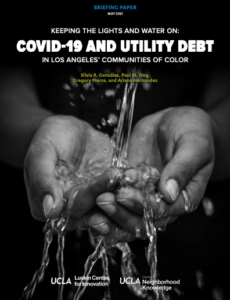Full Title: Keeping the Lights and Water On: COVID-19 and Utility Debt in Los Angeles’ Communities of Color
Author(s): Silvia R. González, Paul M. Ong, Gregory Pierce, Ariana Hernandez
Publisher(s): UCLA Lusking Center for Innovation, UCLA Center for Neighborhood Knowledge
Publication Date: May 7, 2021
Full Text: Download Resource
Description (excerpt):
The COVID-19 public health crisis has deepened existing economic and environmental justice crises in the United States. Previous research by the UCLA Center for Neighborhood Knowledge and its partners shows that the pandemic has exacerbated pre-pandemic health and economic inequalities for disadvantaged neighborhoods. Communities of color in particular have shouldered a disproportionate share of interrelated health and economic risks due to widespread job and income loss, increased housing vulnerability and food insecurity, a lack of basic resources to shelter in place, and less access to critical utilities such as broadband internet service. The pandemic’s economic impacts have also exacerbated the unaffordability of basic environmental service utilization for many households.
In this brief, we study household utility debt burden as another measure of the economic pressure facing low-income neighborhoods, with an emphasis on the impacts on racial equity. Our findings highlight the reproduction of racial and economic inequality during the pandemic. We use data from the one-time Drinking Water COVID-19 Financial Impacts Survey conducted by the California State Water Resources Control Board in November 2020 to examine the prevalence and degree of residential past-due accounts and debt. Utility debt levels serve as a useful proxy to track households that are facing difficulties paying their rent or mortgage, because these two types of debt are likely to be highly correlated during economic crises. Further, when families are unable to pay their bills, they face difficult trade-offs, including skipping meals, delaying or avoiding medical treatment, and risking eviction. While the April 2020 statewide moratorium on utility shutoffs has provided continued utility access for many families, debt on residential accounts has not been forgiven; thus, residential utility debt has accumulated and will be due when the moratorium ends.
